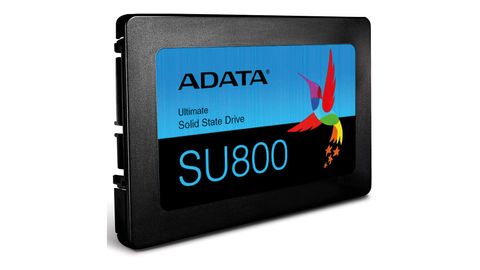IT Pro Verdict
Pros
- +
Strong warranty and endurance
- +
Reasonable value
- +
Competent speeds
Cons
- -
Not the fastest or cheapest drive
There are a lot of different points to consider when it comes to buying an SSD, and one of the more obscure ones is the difference between TLC and SLC. SLC - or ‘single-level cell’ is an architecture in which each physical location on the drive stores a single bit of data, while in a TLC (or ‘triple-layer cell’) drive, each location holds up to three bits. TLC drives are generally cheaper than their SLC counterparts, but storing one bit per location usually results in faster performance.
Adata’s Ultimate SU800 is officially a TLC SSD, but it features a fast SDRAM buffer and a limited amount of SLC cache to help boost performance. Don’t get too excited, though: the 6Gbits/sec SATA interface ensures that this drive won’t be challenging faster USB or M.2 models in the speed stakes.
The SU800 mostly just keeps pace with the more basic Kingston KC600, and lags slightly behind Samsung’s 870 Evo – another TLC drive with an SDRAM cache. In the AS SSD single-threaded random-access test, the SU800 recorded read and write speeds of 31MB/sec and 103MB/sec respectively, while the Samsung managed 44MB/sec and 107MB/sec.
Probably for that reason, the SU800 didn’t quite match up in the PCMark 10 storage benchmarks, with a system drive score of 1,014 versus the Samsung’s 1,178. Will you notice the difference? Probably not, but if you’re stuck on a SATA connection there’s an argument for choosing a drive that makes the most of it.
What, then, makes the SU800 worth considering? First the price: if you’re looking for a 1TB SATA SSD, Samsung’s offerings are the cheapest right now, but £112 is still a very reasonable price to pay for this drive, working out to 12p per gigabyte. There’s no premium for the larger 2TB option, either – it’s almost precisely double the price, at £222.
Adata also makes a strong case for reliability. The SU800’s advertised write endurance is 33% higher than most competing drives at 800TBW for the 1TB model. What’s more, as of July 2020, the warranty on this drive has been upped from three years to five – a reassuring expression of confidence in the hardware.
There’s no specific software bundle for the Ultimate SU800 drive; Adata’s SSD Toolbox lets you monitor the health of your drive and securely clean it if needed, although hardware encryption isn’t supported. Registering your drive also gets you a licence key for Acronis True Image HD. This basic edition doesn’t support file and folder backups, but if you need to clone an old Windows system onto your new SSD, it will do the job.
The Adata Ultimate SU800 isn’t the fastest SATA SSD you can buy, nor the cheapest. It’s not far off on either count, though, and its warranty and endurance ratings are outstanding: if you’re looking for a SATA drive that will stand up to heavier than usual workloads, this one’s the natural choice.
Adata Ultimate SU800 specifications
| Capacity | 1TB |
| Cost Per Gigabyte | 12p |
| Interface | SATA 6 Gbits/sec |
| Claimed Read | 560MB/sec |
| Claimed Write | 520MB/sec |
| Warranty | 5yr |
Darien began his IT career in the 1990s as a systems engineer, later becoming an IT project manager. His formative experiences included upgrading a major multinational from token-ring networking to Ethernet, and migrating a travelling sales force from Windows 3.1 to Windows 95.
He subsequently spent some years acting as a one-man IT department for a small publishing company, before moving into journalism himself. He is now a regular contributor to IT Pro, specialising in networking and security, and serves as associate editor of PC Pro magazine with particular responsibility for business reviews and features.
You can email Darien at darien@pcpro.co.uk, or follow him on Twitter at @dariengs.


